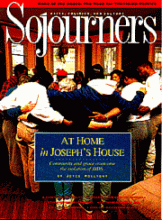I received a phone call during another presidential election, several years ago. One of the candidates wanted a meeting with a few people who could "infuse new ideas into the campaign." But it soon became apparent that the would-be president had a national television appearance on "Face The Nation" the next day and desperately needed some new language and symbols to save his faltering campaign.
Further probing revealed that a substantial discussion of political vision and direction was not really being requested. "Sound bites"--that's what he wanted. He lost. Since then the competition has gotten stiffer. And the public has gotten more cynical.
There is nothing quite like a presidential election year to reveal how empty and dissatisfying our political process has become. "Democracy" has got to mean more than this. Fully two-thirds of the American people now expresses deep concern and dissatisfaction with the basic direction of the country. Yet, another national election will likely go by without those concerns being fundamentally addressed or even seriously discussed. We can safely predict that our declining patterns of voting in the United States will continue this year, with upwards of half of those eligible not bothering to show up on November 3, and untold numbers of people (especially those at the bottom of the economic scale) never even registering to vote.
Read the Full Article

